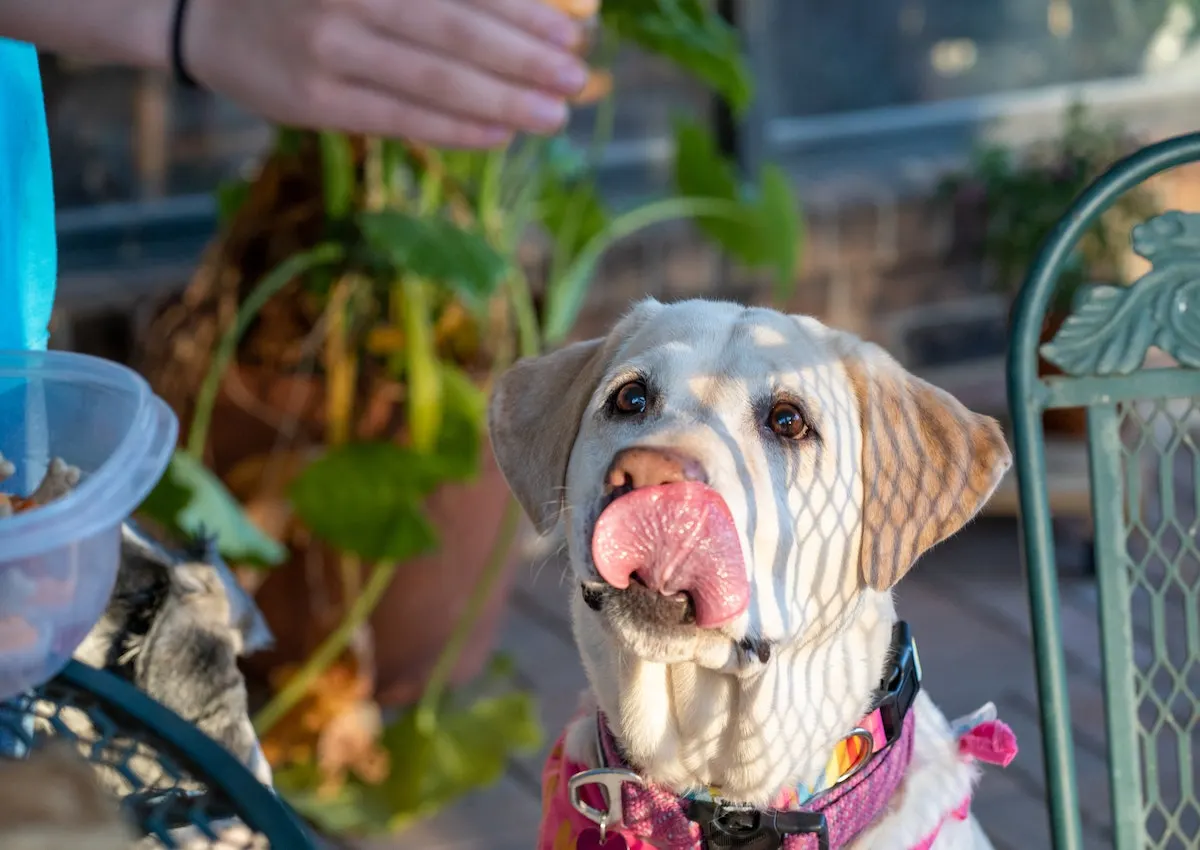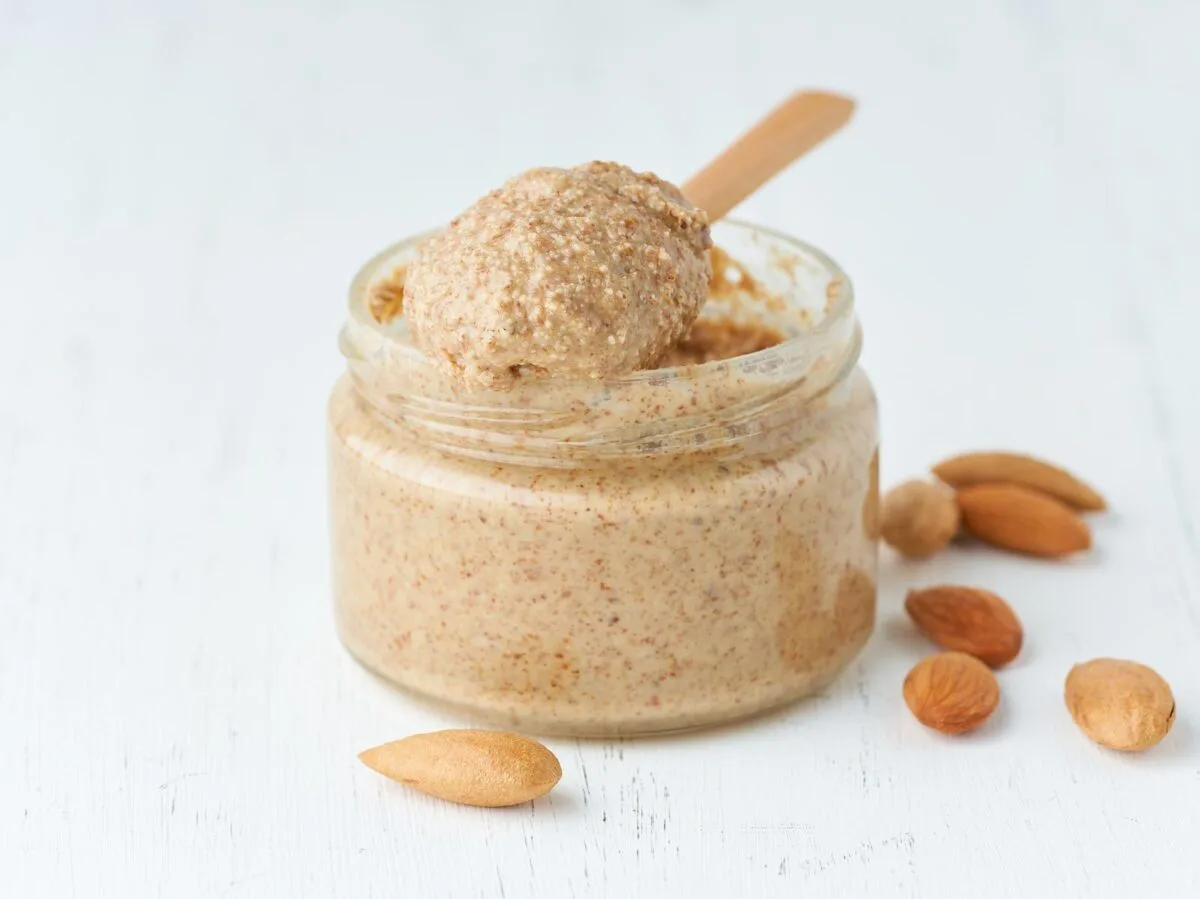Many of us keep an array of nut butters in our homes for delicious snacking and baking. If almond butter is in your pantry you may wonder if dogs can eat almond butter as well? We’ll cover this question in detail so you’re armed with all the information about feeding your dog almond butter.

The rise of alternative nut butters
It’s no secret dogs love peanut butter. We’ve been stuffing it into toys and baking it into homemade treats for dogs for decades.
However, with the rise of peanut allergies in humans, there’s been a shift towards alternative nut butters as evidenced by grocery store shelves everywhere lately. You can even find “no nut” butters made from things like pumpkin seeds or coconut (which despite its name, is more of a fruit than a nut).
But are these alternative nut butters, like almond butter, just as safe for dogs to eat? Let’s dive into the details.
What is almond butter?
Like all nut butters, almond butter is simply processed almonds. Almonds are typically dry roasted (although they can be raw) and then ground until their natural oils release and the nut turns into a smooth, creamy butter-like consistency.
Almond butter has a naturally subtle and mild taste so it’s often jazzed up with other ingredients for increased flavor. Many almond butters on the market will have sugar (or another sweetener), natural flavoring (like vanilla) and salt added to them. This is one of the reasons answering the question of whether dogs can eat almond butter is not so straightforward.

Can dogs eat almond butter?
The moment you’ve been waiting for — “can dogs eat almond butter?”
The answer is yes, they can enjoy small amounts of almond butter.
However, there are a few things to keep in mind:
- No added preservatives
- Watch out for added sugar
- Avoid artificial sweeteners like xylitol which can be fatal to dogs
- Keep portions small
- Make sure your dog is not allergic first
- Almond butter is safe for dogs but almonds may not be
When it comes to feeding your dog almost any human food, it’s best to keep things simple. Most foods are safe for dogs, it’s the added ingredients packaged foods tend to add for flavor purposes that should be avoided if sharing with your pup.
Extra salt, sugar and flavorings are simply not necessary for your dog and since their digestive systems can be sensitive, are best avoided.
If you choose to share almond butter with your dog, make sure to check the ingredient list on the jar. The best almond butter for dogs (and humans if we’re being honest) is one where the only ingredient is almonds.
You can also easily make your own almond butter at home by adding raw or roasted almonds to a food processor and grinding until smooth and creamy. Store some plain for the dog then make maple cinnamon almond butter for the humans to enjoy.
Start by giving just almond butter on a spoon. Isolating the food from anything else is important in case there’s a reaction. This way you can be sure the reaction is attributed to the almonds and nothing else. Offering almond butter when cutting black dog nails is a great way to keep your dog calm and interested in the grooming process.
Almond butter is high in fat
It’s important to remember that almond butter is a high fat food. Like regular butter, too much can upset your dog’s stomach leading to GI distress and contribute to unintended weight gain.
High fat foods should be given in moderation. Use almond butter as a once in awhile treat for your pup, not an everyday occurrence.
Nut allergies in dogs
Just like humans, dogs can easily develop food allergies. While this typically happens with meat proteins in dogs, it can definitely happen with nuts as well.
If you’re thinking about giving your dog almond butter or any other safe nut butter, make sure to test a small amount first to see if any reaction develops. Allergic reactions in dogs typically manifest as itchy paws and skin, vomiting and/or diarrhea.
If you asked a dog a this or that food question between almond butter and other safe nut butters, they probably wouldn’t care, so stick what you know works well for them.

What about other nut butters?
While many other nut butters fall into the same category as almond butter and are safe in moderation, don’t assume that applies to all of them.
Some nuts such as macadamia nuts are actually toxic to dogs and should always be avoided. Walnuts and pistachios are two other varieties that can cause issues.
If you’re unsure of a food being safe for your dog, it’s best to avoid it altogether. Dogs don’t need to eat human food like almond butter. Sharing these types of treats with them is really more about the emotional connection from human to canine than anything else.
Why should dogs not eat almonds?
Despite almond butter being safe for dogs in moderation, whole almonds are not a dog safe food. Since dogs rarely chew their food like humans, the size and shape of an almond makes them a potential hazard.
Small dogs especially can be prone to airway obstruction caused by eating almonds.
Wrapping it up
As a dog owner, you always want what’s best for your dog. Almond butter can be a small part of their diet when used sparingly as a treat. If you’re not making your own, make sure to read labels carefully only choosing brands without extra ingredients.

